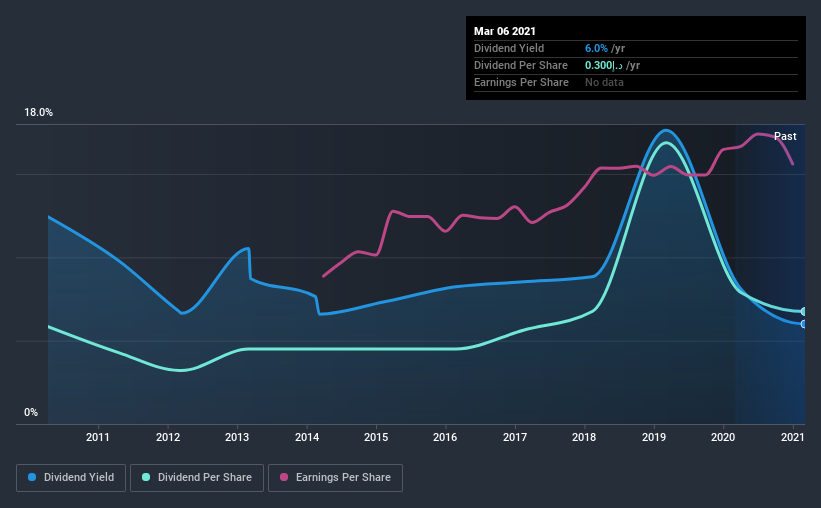- United Arab Emirates
- /
- Insurance
- /
- DFM:DNIR
Here's What You Should Know About Dubai National Insurance & Reinsurance Co. (P.S.C.)'s (DFM:DNIR) 6.0% Dividend Yield

Dividend paying stocks like Dubai National Insurance & Reinsurance Co. (P.S.C.) (DFM:DNIR) tend to be popular with investors, and for good reason - some research suggests a significant amount of all stock market returns come from reinvested dividends. If you are hoping to live on your dividends, it's important to be more stringent with your investments than the average punter. Regular readers know we like to apply the same approach to each dividend stock, and we hope you'll find our analysis useful.
With Dubai National Insurance & Reinsurance (P.S.C.) yielding 6.0% and having paid a dividend for over 10 years, many investors likely find the company quite interesting. It would not be a surprise to discover that many investors buy it for the dividends. Some simple analysis can reduce the risk of holding Dubai National Insurance & Reinsurance (P.S.C.) for its dividend, and we'll focus on the most important aspects below.
Click the interactive chart for our full dividend analysis

Payout ratios
Dividends are typically paid from company earnings. If a company pays more in dividends than it earned, then the dividend might become unsustainable - hardly an ideal situation. So we need to form a view on if a company's dividend is sustainable, relative to its net profit after tax. Looking at the data, we can see that 63% of Dubai National Insurance & Reinsurance (P.S.C.)'s profits were paid out as dividends in the last 12 months. This is a fairly normal payout ratio among most businesses. It allows a higher dividend to be paid to shareholders, but does limit the capital retained in the business - which could be good or bad.
Remember, you can always get a snapshot of Dubai National Insurance & Reinsurance (P.S.C.)'s latest financial position, by checking our visualisation of its financial health.
Dividend Volatility
Before buying a stock for its income, we want to see if the dividends have been stable in the past, and if the company has a track record of maintaining its dividend. Dubai National Insurance & Reinsurance (P.S.C.) has been paying dividends for a long time, but for the purpose of this analysis, we only examine the past 10 years of payments. The dividend has been cut on at least one occasion historically. During the past 10-year period, the first annual payment was د.إ0.3 in 2011, compared to د.إ0.3 last year. This works out to be a compound annual growth rate (CAGR) of approximately 1.5% a year over that time. Dubai National Insurance & Reinsurance (P.S.C.)'s dividend payments have fluctuated, so it hasn't grown 1.5% every year, but the CAGR is a useful rule of thumb for approximating the historical growth.
It's good to see some dividend growth, but the dividend has been cut at least once, and the size of the cut would eliminate most of the growth, anyway. We're not that enthused by this.
Dividend Growth Potential
Given that the dividend has been cut in the past, we need to check if earnings are growing and if that might lead to stronger dividends in the future. Earnings have grown at around 6.2% a year for the past five years, which is better than seeing them shrink! The rate at which earnings have grown is quite decent, and by paying out more than half of its earnings as dividends, the company is striking a reasonable balance between reinvestment and returns to shareholders.
Conclusion
When we look at a dividend stock, we need to form a judgement on whether the dividend will grow, if the company is able to maintain it in a wide range of economic circumstances, and if the dividend payout is sustainable. First, we think Dubai National Insurance & Reinsurance (P.S.C.) has an acceptable payout ratio. Second, earnings growth has been ordinary, and its history of dividend payments is chequered - having cut its dividend at least once in the past. While we're not hugely bearish on it, overall we think there are potentially better dividend stocks than Dubai National Insurance & Reinsurance (P.S.C.) out there.
Companies possessing a stable dividend policy will likely enjoy greater investor interest than those suffering from a more inconsistent approach. Meanwhile, despite the importance of dividend payments, they are not the only factors our readers should know when assessing a company. For example, we've picked out 1 warning sign for Dubai National Insurance & Reinsurance (P.S.C.) that investors should know about before committing capital to this stock.
If you are a dividend investor, you might also want to look at our curated list of dividend stocks yielding above 3%.
If you’re looking to trade Dubai National Insurance & Reinsurance (P.S.C.), open an account with the lowest-cost* platform trusted by professionals, Interactive Brokers. Their clients from over 200 countries and territories trade stocks, options, futures, forex, bonds and funds worldwide from a single integrated account. Promoted
New: Manage All Your Stock Portfolios in One Place
We've created the ultimate portfolio companion for stock investors, and it's free.
• Connect an unlimited number of Portfolios and see your total in one currency
• Be alerted to new Warning Signs or Risks via email or mobile
• Track the Fair Value of your stocks
This article by Simply Wall St is general in nature. It does not constitute a recommendation to buy or sell any stock, and does not take account of your objectives, or your financial situation. We aim to bring you long-term focused analysis driven by fundamental data. Note that our analysis may not factor in the latest price-sensitive company announcements or qualitative material. Simply Wall St has no position in any stocks mentioned.
*Interactive Brokers Rated Lowest Cost Broker by StockBrokers.com Annual Online Review 2020
Have feedback on this article? Concerned about the content? Get in touch with us directly. Alternatively, email editorial-team (at) simplywallst.com.
About DFM:DNIR
Dubai National Insurance & Reinsurance (P.S.C.)
Dubai National Insurance & Reinsurance Co.
Flawless balance sheet and slightly overvalued.


